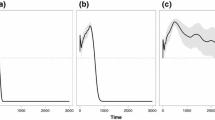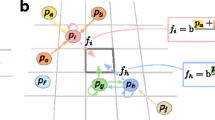Abstract
It is well known that certain environmental conditions, such as a spatially structured population, can promote the evolution of cooperative traits. However, such conditions are usually assumed to be externally imposed. In this paper, we present a model that allows the conditions that promote or hinder cooperation to arise adaptively via individual selection. Consequently, instead of selection simply favouring cooperation under imposed environmental conditions, in our model selection also operates on the conditions themselves via a niche construction process. Results are presented that show that the conditions that favour cooperation can evolve, even though those that favour selfish behaviour are also available and are initially selected for.
Access this chapter
Tax calculation will be finalised at checkout
Purchases are for personal use only
Preview
Unable to display preview. Download preview PDF.
Similar content being viewed by others
References
Pfeiffer, T., Schuster, S., Bonhoeffer, S.: Cooperation and competition in the evolution of ATP-producing pathways. Science 292(5516), 504–507 (2001)
Pfeiffer, T., Bonhoeffer, S.: An evolutionary scenario for the transition to undifferentiated multicellularity. PNAS 100(3), 1095–1098 (2003)
Kreft, J.U.: Biofilms promote altruism. Microbiology 150, 2751–2760 (2004)
Kreft, J.U., Bonhoeffer, S.: The evolution of groups of cooperating bacteria and the growth rate versus yield trade-off. Microbiology 151, 637–641 (2005)
Nowak, M.A., May, R.M.: The spatial dilemmas of evolution. International Journal of Bifurcation and Chaos 3(1), 35–78 (1993)
Wilson, D.S.: A theory of group selection. PNAS 72(1), 143–146 (1975)
Wilson, D.S.: The Natural Selection of Populations and Communities. Benjamin/Cummings, New York (1980)
Sober, E., Wilson, D.S.: Unto Others: The Evolution and Psychology of Unselfish Behavior. Harvard University Press, Cambridge (1998)
Wilson, D.S., Dugatkin, L.A.: Group selection and assortative interactions. The American Naturalist 149(2), 336–351 (1997)
Odling-Smee, F.J., Laland, K.N., Feldman, M.W.: Niche construction: the neglected process in evolution, no. 37. Princeton University Press, Princeton (2003)
Keller, L. (ed.): Levels of Selection in Evolution. Monographs in behavior and ecology. Princeton University Press, Princeton (1999)
Author information
Authors and Affiliations
Editor information
Rights and permissions
Copyright information
© 2007 Springer-Verlag Berlin Heidelberg
About this paper
Cite this paper
Powers, S.T., Penn, A.S., Watson, R.A. (2007). Individual Selection for Cooperative Group Formation. In: Almeida e Costa, F., Rocha, L.M., Costa, E., Harvey, I., Coutinho, A. (eds) Advances in Artificial Life. ECAL 2007. Lecture Notes in Computer Science(), vol 4648. Springer, Berlin, Heidelberg. https://doi.org/10.1007/978-3-540-74913-4_59
Download citation
DOI: https://doi.org/10.1007/978-3-540-74913-4_59
Publisher Name: Springer, Berlin, Heidelberg
Print ISBN: 978-3-540-74912-7
Online ISBN: 978-3-540-74913-4
eBook Packages: Computer ScienceComputer Science (R0)




